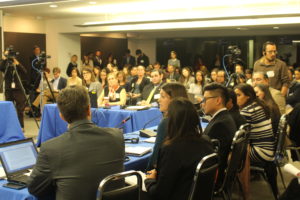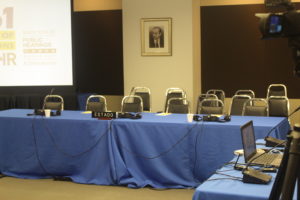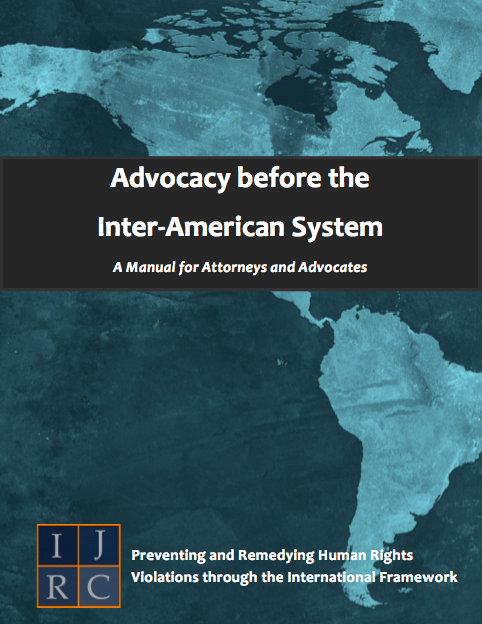 On March 21, 2017, the Inter-American Commission on Human Rights (IACHR) held a public hearing in Washington, D.C. to examine President Trump’s executive orders that have implicated the human rights of individuals and communities in the United States and abroad. The IACHR is an independent human rights monitoring body with jurisdiction over the United States and the 34 other members of the Organization of American States.
On March 21, 2017, the Inter-American Commission on Human Rights (IACHR) held a public hearing in Washington, D.C. to examine President Trump’s executive orders that have implicated the human rights of individuals and communities in the United States and abroad. The IACHR is an independent human rights monitoring body with jurisdiction over the United States and the 34 other members of the Organization of American States.
 This hearing followed a February 2017 joint letter by the International Justice Resource Center (IJRC) and American Civil Liberties Union (ACLU) that urged the IACHR to hold an emergency hearing on the “travel ban.” Several dozen civil society organizations and academic institutions signed on in support of the request. IJRC and our partners are pleased that the Commission decided to take an active role in monitoring the human rights implications of these wide ranging executive orders.
This hearing followed a February 2017 joint letter by the International Justice Resource Center (IJRC) and American Civil Liberties Union (ACLU) that urged the IACHR to hold an emergency hearing on the “travel ban.” Several dozen civil society organizations and academic institutions signed on in support of the request. IJRC and our partners are pleased that the Commission decided to take an active role in monitoring the human rights implications of these wide ranging executive orders.
The IACHR invited civil society organizations, indigenous peoples, and the United States government to appear at the hearing and make presentations concerning the factual and legal implications, in view of the United States’ human rights obligations, and to respond to the commissioners’ questions. The civil society participants made a number of specific requests for concrete monitoring and follow-up on the part of the IACHR.
However, the United States government failed to attend or participate, an unusual departure from previous administrations’ engagement with the IACHR. The hearing would have afforded the government an opportunity to defend its actions and answer the commissioners’ questions. Instead, the no-show by the U.S. government yielded headlines around the world, via the New York Times, U.S. News & World Report, Euronews, Jerusalem Post, Independent, teleSUR, Reuters, Washington Times, Huffington Post, SFGATE, Miami Herald, Los Angeles Times, Wisconsin Gazette, Quartz, and Voice of America, and on legal blogs including Just Security and Human Rights At Home.
The hearing covered three executive orders: 1) “Border Security and Immigration Enforcements Improvements” (on expansion of immigration enforcement and detention and the construction of a border wall); 2) “Protecting the Nation from Foreign Terrorist Entry into the United States” (the “travel ban” or “Muslim ban”); and, 3) “Expediting Environmental Reviews and Approval for High Priority Infrastructure Projects” (fast-tracking approval of infrastructure projects such as the Dakota Access and Keystone XL pipelines).
Speakers: Jamil Dakwar (American Civil Liberties Union), Roberto Borrero (International Indian Treaty Council), Jin Kim (Harvard Immigration and Refugee Clinic), Malene Alleyne (Harvard Immigration and Refugee Clinic), Jennifer Johnson (Southern Border Communities Coalition), Maru Mora Villalpando, Sarah Mehta (American Civil Liberties Union), Abed Ayoub (American-Arab Anti-Discrimination Committee), Lisa Reinsberg (International Justice Resource Center)
On November 15, 2017, IJRC, the ACLU, and 21 other supporting organizations submitted a follow-up letter to the Inter-American Commission, updating it on developments related to the “travel ban” or “Muslim ban” and asking for its continued oversight. On March 2, 2018, IJRC and partners submitted a separate follow-up letter regarding the Executive Order on environmental reviews and infrastructure projects.
Submissions to the Inter-American Commission on Human Rights
- request for IACHR monitoring and follow-up
- factsheets on the executive orders (travel ban, border wall, environmental reviews)
- ACLU submission
- International Indian Treaty Council submission
- Harvard Immigration and Refugee Clinic submission and accompanying report
- follow-up coalition letter regarding migration policy, of November 15, 2017
- follow-up coalition letter regarding environmental policy, of March 2, 2018
Hearing Request
Inter-American Commission Responses
- public hearing on March 21, 2018
- hearing synopsis reiterating call for urgent action by U.S.
- statement regarding the executive orders
Executive Orders and Court Decisions
- Executive Order “Protecting the Nation from Foreign Terrorist Entry into the United States” (and revised version and third revision)
- Executive Order “Border Security and Immigration Enforcements Improvements” (and guidance memo)
- Executive Order “Expediting Environmental Reviews and Approval for High Priority Infrastructure Projects”
- Nationwide preliminary injunctions or temporary restraining orders granted by U.S. District Courts for the districts of Hawaii, Maryland, and Western Washington
- decision by the U.S. Supreme Court, upholding the third revision of the “travel ban”
U.S. Human Rights Obligations
- American Declaration of the Rights and Duties of Man
- IACHR report Immigration in the United States: Detention and Due Process (2010)
- IACHR report Refugees and Migrants in the United States: Families and Unaccompanied Children (2015)
- IACHR report Indigenous and Tribal Peoples’ Rights over their Ancestral Lands and Natural Resources (2009)
- IJRC guide on Asylum & the Rights of Refugees
- IJRC guide on Immigration and Migrants’ Rights
- IJRC news post on the “travel ban”
- IJRC news post on U.S. immigration policy
- ACLU blog post on the hearing
- ACLU article on U.S. human rights obligations

